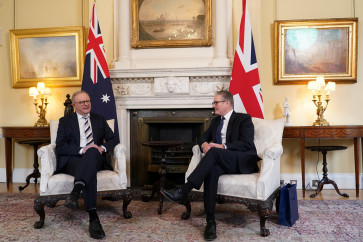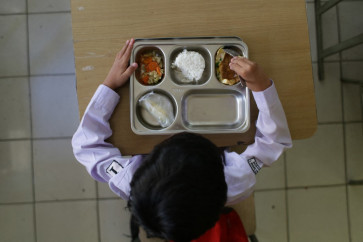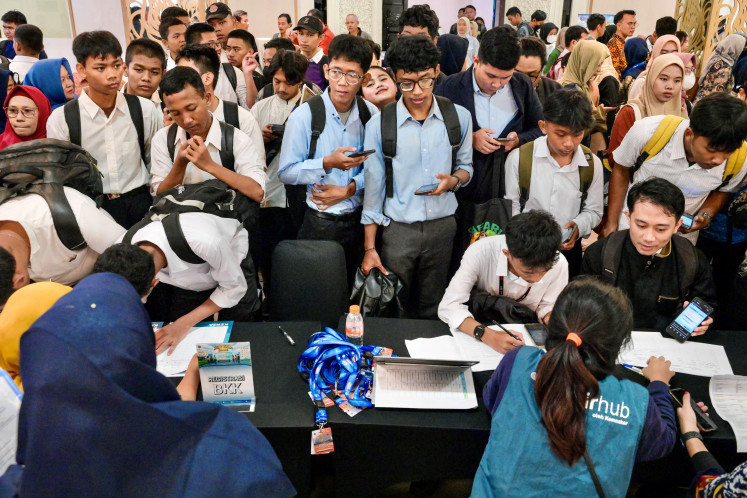Popular Reads
Top Results
Can't find what you're looking for?
View all search resultsPopular Reads
Top Results
Can't find what you're looking for?
View all search resultsCheap cigarettes lure children into smoking
Fight against cigarettes: The National Commission on Tobacco Control (Komnas PT) gathers more than 1,000 women from various organizations and institutions, including the Indonesian Midwives Association (IBI), the Indonesian Teachers Association (PGRI) and the Indonesian Scout Movement (Pramuka Indonesia), to announce the #RokokHarusMahal (Cigarettes Must be Expensive) campaign in Jakarta’s Kota Tua on Saturday
Change text size
Gift Premium Articles
to Anyone
F
ight against cigarettes: The National Commission on Tobacco Control (Komnas PT) gathers more than 1,000 women from various organizations and institutions, including the Indonesian Midwives Association (IBI), the Indonesian Teachers Association (PGRI) and the Indonesian Scout Movement (Pramuka Indonesia), to announce the #RokokHarusMahal (Cigarettes Must be Expensive) campaign in Jakarta’s Kota Tua on Saturday. (JP/Nurul Fitri Ramadhani)
Hartiningsih, 35, cannot bear her sadness each time she sees her 9-year-old son smoking. She never expected that her eldest son would get addicted to cigarettes at such a young age.
“Sometime he smokes at home, but he will stop when I scold him. I’m sure that he smokes every day when he is at school because many of his friends smoke,” said Hartiningsing, a resident of Leuwigajah in Cimahi, West Java.
She went on to say she did not want to inhale cigarette smoke at her house because she was expecting her second child.
She could not do anything to keep her house free from cigarette smoke because it was her husband’s smoking habit that might have influenced their child’s behavior. Hartiningsih said she had cut down her son’s pocket money to Rp 5,000 (36 US cents) from Rp 7,000, but this did not stop him smoking.
“He can still buy them because each cigarette costs only Rp 1,000,” she said.
Hartiningsih is likely one of millions of people, particularly women, in Indonesia who share a similar concern: they all want their children to be healthy and to stop wasting money.
A recent study conducted on active smokers in Indonesia revealed that they can spend between Rp 500,000 and Rp 700,000 per month on cigarettes, each pack can cost Rp 5,000 to Rp 20,000.
“This is too cheap. Indonesia is one of the countries in Southeast Asia with the cheapest cigarettes. People can even buy a single cigarette instead of buying them in packs,” National Commission on Tobacco Control chairwoman Mia Hanafiah said on Saturday.
She was speaking during the launch of a campaign organized by the commission titled #RokokHarusMahal (Cigarettes Must be Expensive). More than 1,000 women from various organizations and institutions, including the Indonesian Midwives Association (IBI), the Indonesian Teachers Association (PGRI) and the Indonesian Scout Movement (Pramuka Indonesia) are participating in the campaign, which has also been published on online petition website change.org, demanding that the government raise the price of cigarettes to Rp 50,000 per pack.
Data collected in 2016 by the Southeast Asia Tobacco Control Alliance show that the prices of popular cigarette brands in Indonesia stood at $1.49 on average, much cheaper than Singapore ($9.62), Brunei Darussalam ($5.10), Malaysia ($4.17) and Thailand ($3.28).
Mia said such low prices for cigarettes meant that more young people smoked, which could have long-term health consequences.
In 2013, the Health Ministry recorded 70 million active smokers in Indonesia, 7.4 percent of whom were children and teenagers aged from 10 to 18 years old. The government planned to reduce the figure to 5.4 percent by 2019, but the number of young smokers in the country rose to 8.8 percent in 2016, a sharper rise than the increase in adult smokers, which stood at only around 1 percent.
“Children tend to refer to their role models. When they see that many men smoke, they will think that a cool man smokes,” said Theresia Sandra Dian Ratih, head of the chronic and degenerative disease control subdirectorate of the Health Ministry’s infectious disease prevention and control directorate.
“Massive cigarette ads displaying images of young, attractive people who smoke have lured kids into smoking.”
Theresia said once children got addicted to cigarettes, their intelligence would be affected as severe oxygen shortage in their brains would prevent them from developing well.
A 2017 study commissioned by the Health Ministry’s health research and development agency revealed that the total losses from cigarette consumption, including for medical expenses and productivity losses, amounted to an estimated Rp 569 trillion, enough to build and renovate 16,000 schools across Indonesia.
Meanwhile, Finance Ministry data showed that state revenue from cigarette excises was only Rp 138 trillion in 2016, not even half the total losses.
Mia said a high price could significantly reduce the number of young smokers, and even those who come from the middle-lower class.
“At first, it may be just fine for them to spend Rp 50,000 on a pack of cigarettes. Sooner or later, they will see that cigarette smoking will just be a financial burden on them.”










